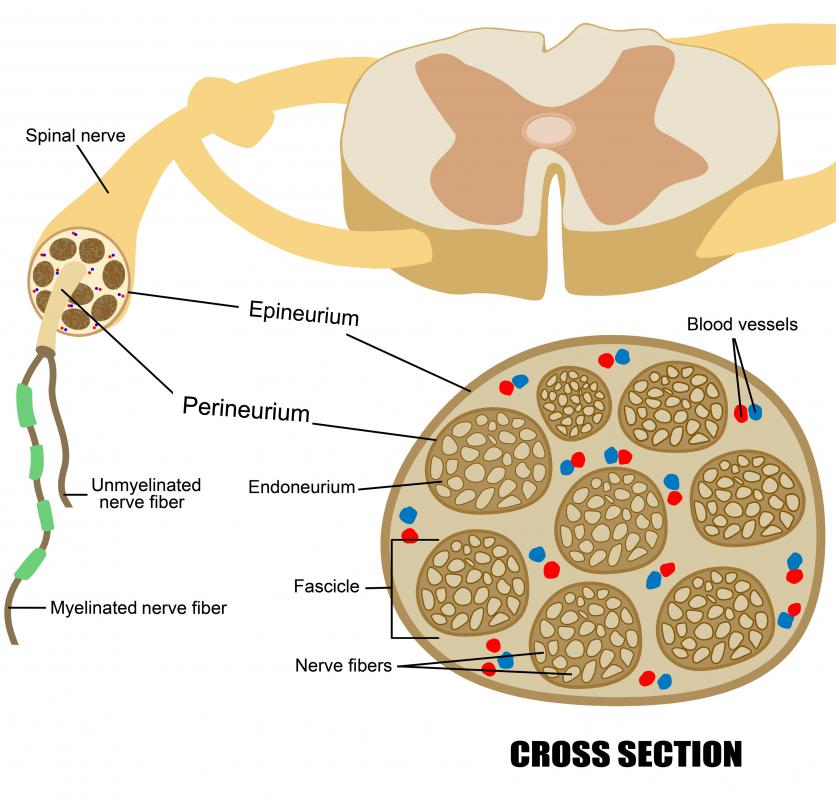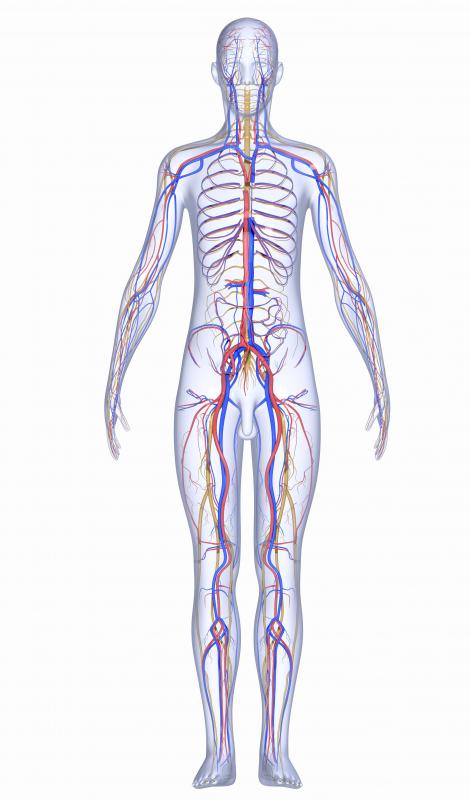At TheHealthBoard, we're committed to delivering accurate, trustworthy information. Our expert-authored content is rigorously fact-checked and sourced from credible authorities. Discover how we uphold the highest standards in providing you with reliable knowledge.
What are the Main Parts of the Nervous System?
Parts of the nervous system, the system of the body that oversees the function of all other systems, include its main organ, the brain; its vessels, the spinal cord and peripheral nerves; and its cells, known as neurons, which transmit the electrical signals that are nerve impulses. The nervous system can be split into two subsystems: the central nervous system includes the brain and spinal cord as well as the retina of the eyes, and the peripheral nervous system includes all the nerves that exit the spinal cord to travel throughout the body, transmitting signals between the body and the brain such as motor and sensory impulses. Beyond this, the peripheral system features a subdivision known as the autonomic nervous system, which controls involuntary visceral functions, such as heart rate, salivating, and perspiring.
Of the various parts of the nervous system, the brain can be thought of as the control center. Occupying much of the head in humans and protected by the skull in all vertebrates, it is where nerve impulses originate, in the case of voluntary functions such as picking up a book. It is also where they are interpreted, as when one senses that a plate is hot, and recognizing this, the brain tells one to snatch her hand away. As a component of the central nervous system, which coordinates all bodily function and behavior, it receives information from the peripheral nervous system about what is happening both inside and outside of the body and reacts accordingly.

The brain does this by transmitting and receiving nerve impulses via the spinal cord, the part of the central nervous system that channels them to and from the peripheral nervous system. Protected by the vertebral column, the spinal cord is a thick bundle of nerves and the glial cells that form a protective enclosure around them, much like the rubber casing on an electric cable. It is among the components of the nervous system that are responsible for the transmission of nerve impulses, meaning that it both sends information from the brain to the peripheral nervous system and receives information from the peripheral nervous system about stimuli in the body or in the environment. This is not the only function of the spinal cord, however. It is involved in dictating certain motor reflexes, or involuntary movements of muscles in response to a particular stimulus.

Emanating from the spinal cord are the spinal nerves, a major component of the peripheral nervous system. A paired system of nerves, there are 31 pairs of spinal nerves in total, with one pair exiting either side of the spinal column for each vertebral segment and each one branching into smaller nerves that reach all areas of the body. These parts of the nervous system carry three kinds of signals between the body and the brain: motor, sensory, and autonomic. Motor signals travel from the brain out to the body’s muscles, sensory signals come from receptors in the body and bring information to the brain about such external stimuli as temperature and pain, and autonomic signals maintain communication with the brain about whether all bodily systems are working correctly. They are transmitted along chains of individual nerve cells called neurons, the parts of the nervous system that physically carry these electrical impulses from the brain to the body and vice versa.
AS FEATURED ON:
AS FEATURED ON:















Discussion Comments
@Drentel - There are herbs that can be used to treat every part of the body, and this definitely includes the nervous system. You should look into getting some of the herbal supplements that help to stimulate the brain and the rest of the nervous system if you are concerned about developing Alzheimer's, or some other disease of the nervous system.
It's easy to take our health for granted when we are young and everything is working the way it is supposed to work. I never thought about my health much at all when I was younger. Sometimes I would get an injury playing sports, but those things healed quickly and I was as good as new.
I don't think many people really know how the nervous system works, or even give it much thought. What really changed my way of looking at things and started me to thinking about my health and what I would be like as I got older was when my mother got Alzheimer's. Since then I have been reading more information about the functions of the nervous system and the diseases and conditions that attack this system.
Originally, most studies said that nervous system diseases like Alzheimer's had nothing to do with whether or not members of your family had it. However, recent studies show that some diseases like Alzheimer's are sometimes related to an inherited gene. So if you have nervous system disorders in your family then you should be aware that they could be genetic in some cases.
Post your comments